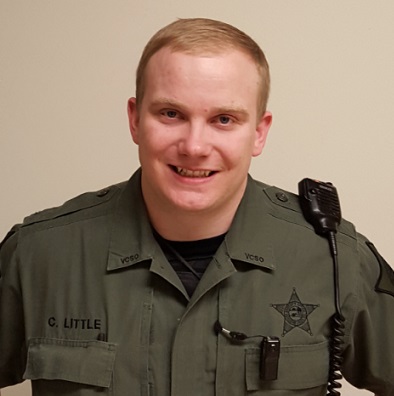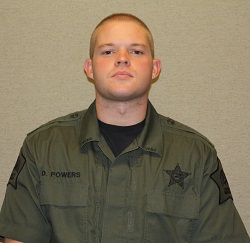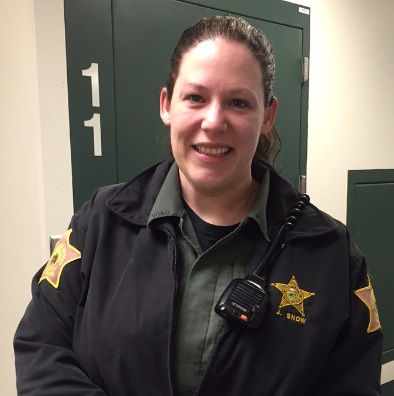The Evansville Police Department and the Sheriff’s Office have a long history of recruiting police officers and sheriff’s deputies from the ranks of confinement officers. Evansville Police Chief Billy Bolin explained, “Many of our officers get their start as confinement officers at the jail. The training and skills officers acquire working at the jail is readily applicable to police work. The majority of the criminals we catch on the outside have spent time in the jail before.” Chief Bolin added, “Confinement officers who make the transition to the police department hit the street already knowing the names and faces of Evansville’s repeat offenders.”
When a sheriff’s deputy, police officer or state trooper makes an arrest, the accused is brought to the intake area of the Vanderburgh County Jail. Referred to collectively as “booking”, this intake area contains a workspace for law enforcement officers to complete the required documentation of a fresh arrest. All confinement officers know first-hand how the booking process works, which gives police officers and sheriff’s deputies who have a jail background a tremendous advantage.
Sheriff Dave Wedding stated, “When I was hired as a jailer in 1981, arrest records and affidavits were entirely paper based. Now a large portion of the training our confinement officers receive consists of learning our computerized records system and jail management system. Nothing that involves the inmates within our jail occurs without proper documentation. Our officers learn how to write reports, complete arrest affidavits and document incidents. These skills are directly translatable to general law enforcement, particularly for the Evansville Police Department who shares our records software.”
The training process for new confinement officers begins with the Sheriff’s Office Confinement Officer Training School (COTS). A new confinement officer will initially undergo three weeks of classroom training. The officer will then be assigned to a Field Training Officer (FTO) for an additional eight weeks before being permitted to work alone. The entire COTS program is modeled after the same program used to train sheriff’s deputies.
“Confinement officers in the jail are sworn law enforcement officers while they are on-duty. Our confinement officers make arrests for offenses observed or reported to them, restrain violent individuals and file required reports,” Sheriff Wedding explained. “Just like a police officer who patrols a beat or a sheriff’s deputy who patrols a district, our confinement officers patrol the jail and keep the peace in their assigned housing units.”
Chief Bolin added, “I know Sheriff Wedding hates to lose good employees, but we both recognize the benefits of this informal partnership. The Police Department gains trained and tested officers and the Sheriff’s Office maintains a reputation as a great place to begin a career in law enforcement.”



Pictured above (left to right): Officer Cory Little, Officer Dillon Powers and Officer Jackie Snow.
-END-